The Chromebook Pixel (2015) Review
by Brandon Chester on March 16, 2015 8:00 AM EST- Posted in
- Laptops
- Chrome OS
- Chromebook
- Chromebook Pixel
CPU Performance
Chrome OS is extremely lightweight, which makes sense for an operating system that has to run on processors that range from Intel's Core i7 at the high end, to Intel Atom and ARM processors at the low end. Most devices running Chrome OS are closer to that lower end, and that coupled with the web application nature of Chrome OS doesn't make it a large target for benchmark developers. The situation is arguably even worse than mobile benchmarking since the only benchmarks a device can be tested in are web benchmarks, but we have to work with what we have. The new Chromebook Pixel is powered by Intel's Core i5-5200U processor, which is one of Intel's new Broadwell-U parts.
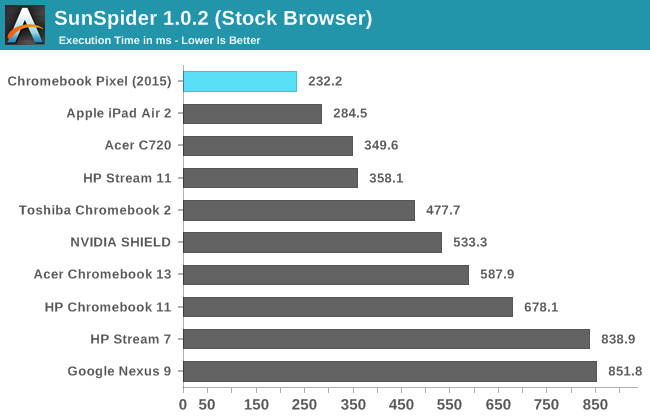
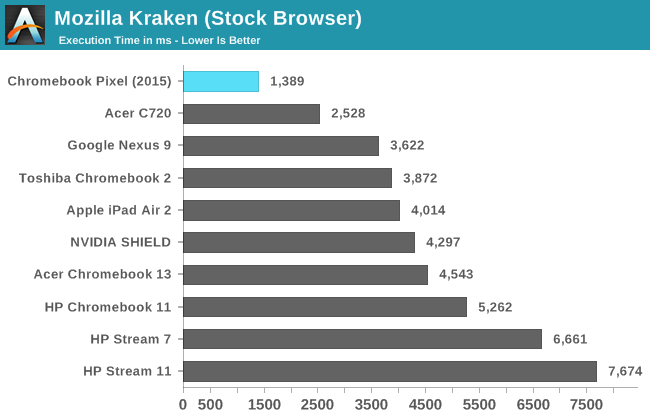
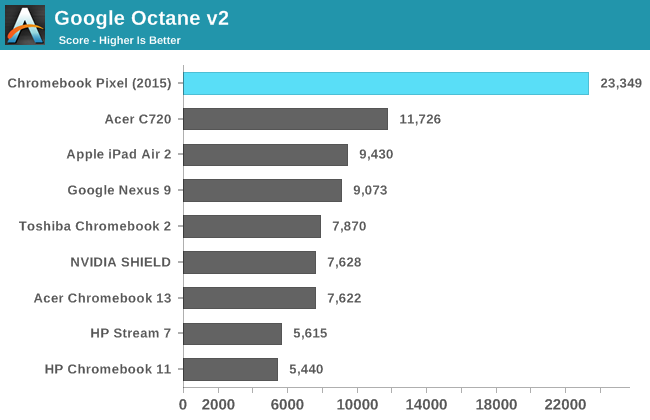
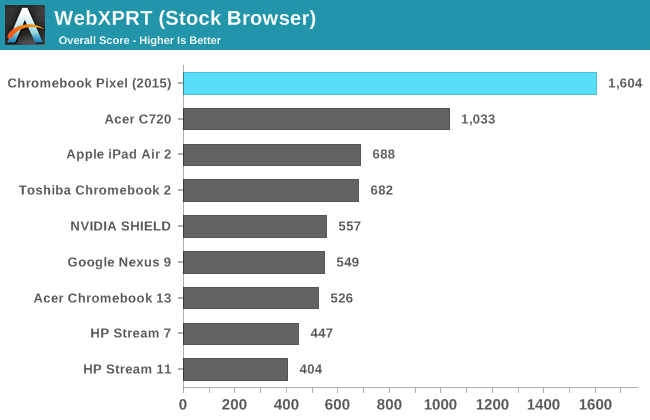
| Additional Performance Results | ||||
| Acer C720 | Acer CB13 | Toshiba Chromebook 2 | Chromebook Pixel (2015) | |
| CrXPRT | 96 | 55 | 61 | 161 |
| Spacerocks (WebGL - FPS) | 18 | 30 | 11 | 45 |
The CPU performance of the original Pixel could be described as completely overkill for running Chrome OS, and the same is true for this year's iteration. The Pixel gives you whats is undoubtedly the smoothest and fastest Google Chrome experience available. While I find the performance of an Intel i5 to be unnecessary to do something as simple as run Chrome and web apps, it definitely comes in handy if you're running some other version of Linux overtop of Chrome OS.
WiFi Performance
The 2013 Chromebook Pixel had dual spatial stream 802.11n WiFi and Bluetooth 3.0. In early 2013, this was fairly common among laptops, although 802.11ac adoption on high end laptops began not long after. The 2015 Chromebook Pixel uses Intel's Intel 7260 WiFi + BT 4.0 module, with 2x2 802.11ac support. This brings the max theoretical WiFi speed up to 866Mbps, a substantial improvement over the 300Mbps max on the 2013 model. Real world performance will almost always be lower than theoretical maximums, and to test WiFi performance I've used iPerf to get an idea of what the maximum throughput is on the Pixel.
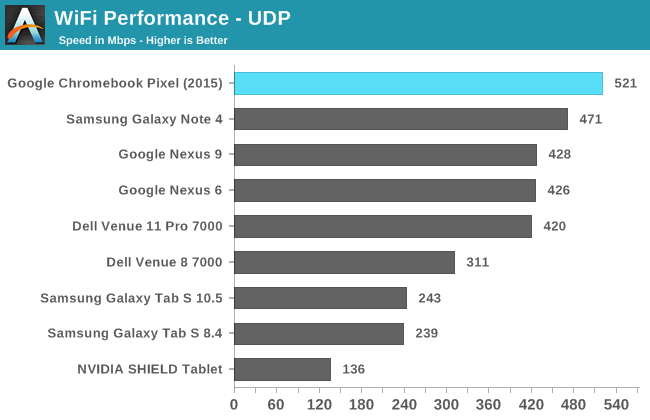
In most of our tests I've compared the Pixel to other Chromebooks, tablets, and smartphones. This is mostly due to the previously mentioned benchmarking limitations on Chrome OS. To keep consistent with this, and to avoid making unfair comparisons to laptops which aren't tested using iPerf, I've just run the Pixel through our smartphone/tablet WiFi benchmark. This still gives an idea of how fast the Pixel is, without comparing it to other laptops that were not tested in the exact same manner.










123 Comments
View All Comments
some_guy - Saturday, April 11, 2015 - link
There are built in shortcuts for these keys along with a bunch of other shortcuts. ( Page up is Alt up arrow )https://support.google.com/chromebook/answer/18310...
My question is that if I were to install Linux, will the shortcuts also be there or will I have to do them myself somehow or search for something on the Internet. Thanks.
djscrew - Monday, March 16, 2015 - link
How come nearly every Chrome laptop is hideous.zodiacfml - Monday, March 16, 2015 - link
Too expensive. How much is the Yoga 3?cjb110 - Tuesday, March 17, 2015 - link
Is that battery charge test right? Seems a massive increase with no apparent reason that covers it, the components could only do so much. Kudos to Google if it is true, butl_d_allan - Tuesday, March 17, 2015 - link
Did I miss comments and evaluation about on-board storage? The SSD looks rather wimpy, but I didn't notice any numbers, charts, wordage one way or the other.Or is that considered irrelevant to a ChromeBook?
eanazag - Tuesday, March 17, 2015 - link
This is a laptop for Google employees.shm224 - Wednesday, March 18, 2015 - link
I still don't get why "browser/js engine" benchmarks are showing here as "CPU performance." I think Ho has once explained that that is purely for comparing the performance within the same product line, but I don't see any previous iterations (of Chromebooks) listed here. To the contrary, the web/js benchmarks are compared against the latest competing products as if they are at all relevant to CPU performance. I think the web/js benchmarks somewhat relevant here because everything on Chromebooks runs on Google's Chrome browser, but Anandtech still continues to use the same methodology to evaluate smartphones for instance where web browsing no longer represents much of smartphone usage.ntd11 - Friday, March 20, 2015 - link
How many here have tried a Chromebook for more than a few hours? I'm talking about logging in remotely and doing work from the comfort of a couch. Maybe its because I've been doing that sort of work since... 1992, back when the only computers that could do real work were called 'supercomputers' built up some habits. (Anyone else remember 'Xwindows?').After two years using a Chromebook I wanted something much better. For a year I haven't picked up my tablet. I either used my large smartphone, the Chromebook, or I wanted a multi-monitor workstation with the ergo keyboard/mouse, and enough RAM to actually do simulations.
I'm not the developer. But I look at it this way, everyone I've loaned my now obsolete Chromebook has bought one. Look at the benchmarks. If you log into a web page to work remotely, this is the machine. I used to have 20+ tabs open on a really low end Chromebook that would make a decent windows machine beg for mercy.
Take a minute to realize why the growing Chromebook community is excited about this laptop. I bet I'm the only one here actually posting from a Chromebook pixel. I came to read the review from a 'non-Chromebook fan site.'
Is it a great value? Well, so-so. But I wanted the long battery life. I like to wander to the back yard and work for hours. Then I wander into a quiet room and watch a movie. So nice to not worry about a power cord. The only downside is I find printing from a Chromebook not worth the hassle. I send documents to my windows machine and print from there. But look at the benchmarks. As a web browsing machine... this is fast.
Note: I do remote engineering. Not development for iPhones, Android, or Chromebooks. I use high end software that someone else has developed to simulate complex physics. This is now the Chromebook everyone can say 'that is too expensive' and buy one half (or less) the price. But
I find windows machines slow too much with age. My old Chromebook never did. Apple machines slow with every OS upgrade. It is preference.
HanTorso - Thursday, April 9, 2015 - link
I feel this would be great if it just had at least a 256gb ssd. I would install Linux on it, and maybe use the Chrome OS just for simple things. The most important element is the 3:2 aspect ratio, which makes it superior to any non-Apple laptop display. The price is still too expensive though, because except for the screen, it doesn''t seem to have any advantage over an Apple laptop of the same price.dodysw - Sunday, May 31, 2015 - link
Brandon, according to https://support.google.com/chromebook/answer/61645... the Chromebook Pixel 2015 battery capacity is 72Wh, not 59Wh as specified in your article.